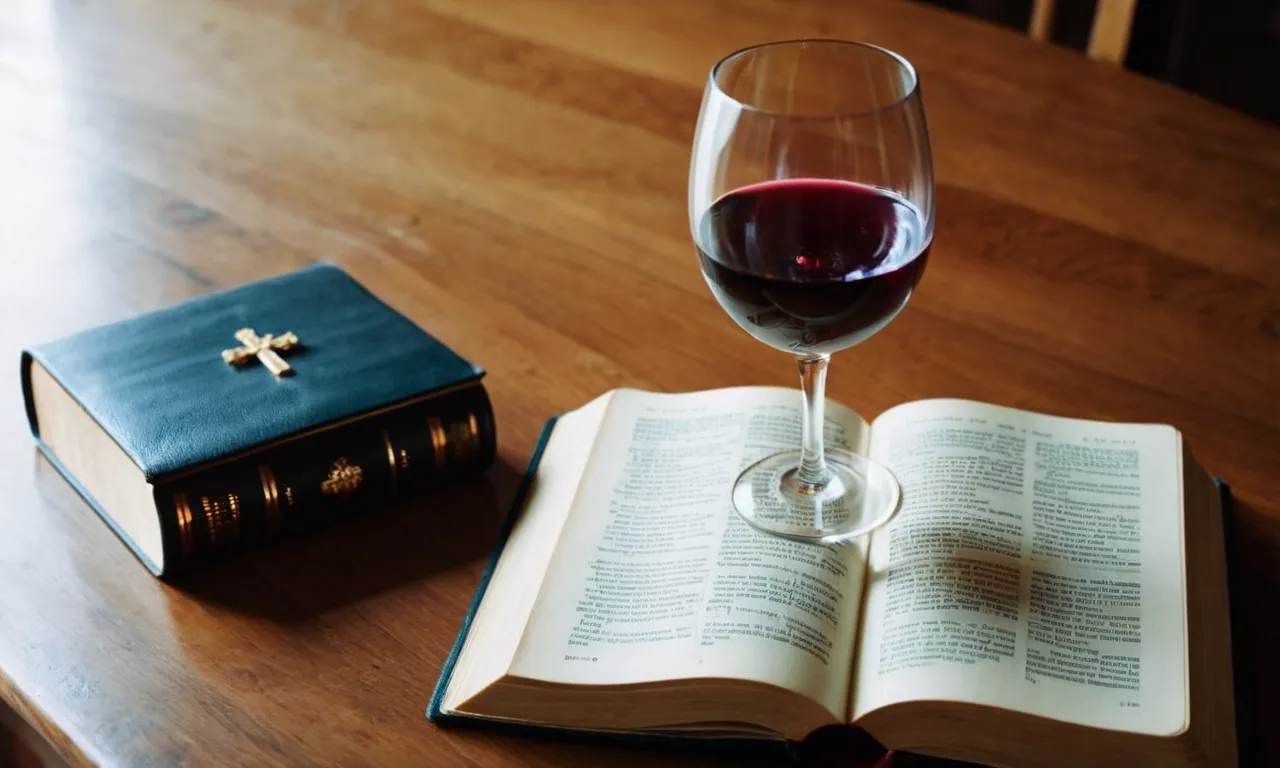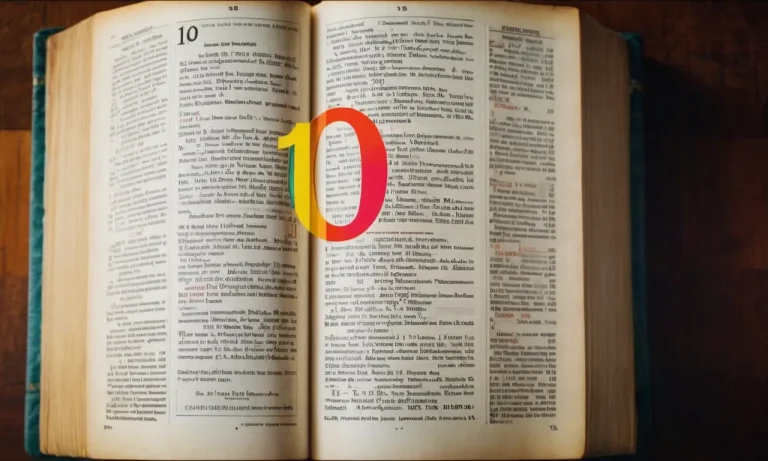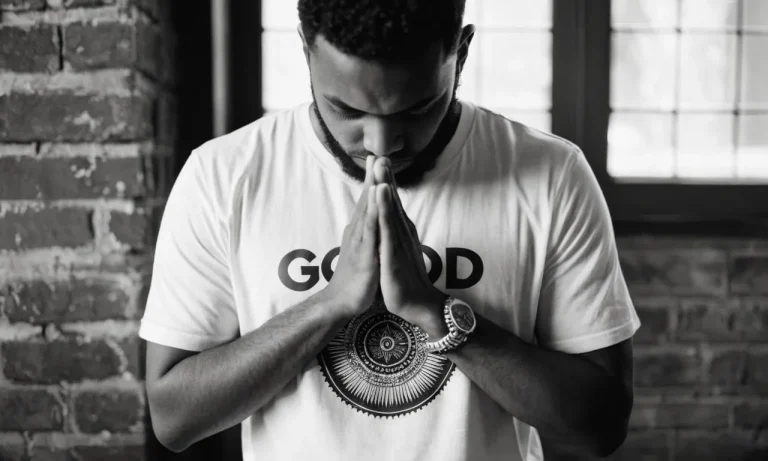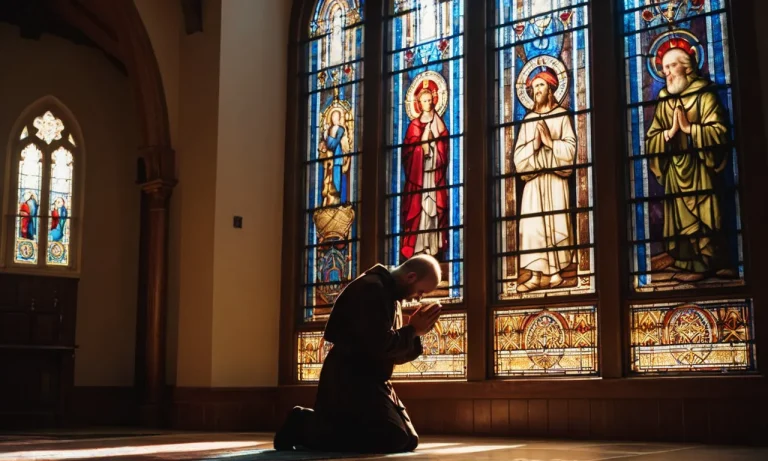What Does The Bible Say About Drinking And Partying?
If you’re looking for answers about what the Bible teaches regarding alcohol consumption and revelry, you’ve come to the right place. We’ll provide a comprehensive, nuanced look at relevant biblical passages to help you understand the Judeo-Christian perspective on drinking and partying.
If you’re short on time, here’s a quick answer to your question: The Bible does not completely forbid drinking alcohol, but it strongly warns against drunkenness and debauchery. Moderation and self-control are key.
In this approximately 3000 word article, we’ll examine verses throughout the Old and New Testaments that address these issues. We’ll consider the cultural context of biblical times and distill timeless principles that remain applicable today.
Expect a balanced, thorough analysis on this complex and important subject.
Old Testament Warnings Against Excessive Drinking
Noah’s Drunkenness in Genesis 9
The story of Noah’s drunkenness after the flood serves as a warning against excessive drinking. After the flood, Noah planted a vineyard and made wine. He drank too much of the wine, became drunk, and “lay uncovered inside his tent” (Genesis 9:21).
Noah’s son Ham saw his father’s nakedness and told his brothers about it instead of covering his father’s shame. When Noah awoke and realized what had happened, he placed a curse on Ham’s son Canaan. This story illustrates how excessive drinking can lead to shameful behavior and strained familial relationships.
Restrictions for Nazirites and Priests in Leviticus
The books of Leviticus and Numbers placed restrictions on drinking for certain groups in Israelite society. Nazirites were individuals who took a vow to separate themselves to the Lord for a period of time.
During their vow, Nazirites were instructed to not consume wine or any product of the grape vine (Leviticus 10:9-10). The high priest was also forbidden from drinking wine while serving in the tabernacle (Leviticus 10:8-9).
These restrictions indicated that drunkenness was seen as incompatible with holiness and proper service to God.
The Book of Proverbs’ Admonitions
The Book of Proverbs contains multiple warnings against excessive drinking. It advises kings and rulers not to consume too much wine, lest they “drink and forget what has been decreed” and “deprive all the oppressed of their rights” (Proverbs 31:4-5).
Drunkenness is associated with gluttony, poverty, laziness, and woe in Proverbs (Proverbs 23:20-21, 29-35). The book urges people to avoid “tarrying long over wine” and warns that alcohol can lead to violent behavior (Proverbs 20:1, 23:29-30).
Overall, Proverbs portrays drunkenness as unwise and antithetical to righteous living.
Examples of Drunkenness Receiving Punishment
Lot and His Daughters in Genesis 19
The story of Lot and his daughters in Genesis 19 illustrates how drunkenness led to sinful and disastrous behavior. After fleeing the destruction of Sodom, Lot’s two daughters got their father drunk and had sexual relations with him in order to continue their family line (Genesis 19:30-38).
This resulted in the births of Moab and Ben-Ammi, founders of future enemies of Israel.
This account is a grim warning against drunkenness and how it impairs moral judgment. God clearly condemns drunken behavior that leads to terrible sins like incest. The fate of Lot and his daughters shows drunkenness brings God’s judgment and punishment.
Nadab and Abihu’s Sacrilege in Leviticus 10
In Leviticus 10, Aaron’s sons Nadab and Abihu are punished by God for drunkenly offering “unauthorized fire” before the Lord (Leviticus 10:1-3). Despite being priests, they disrespected God by their irreverent worship, likely due to alcohol impairment. As a result, fire came out and consumed them.
This illustrates God’s hatred of irreverent worship, often fueled by drunkenness. Consuming alcohol and then attempting to lead others spiritually is dangerously presumptuous. Nadab and Abihu’s fate is a sober warning that God punishes those who ignorantly or flippantly approach Him while drunk.
Belshazzar’s Feast in Daniel 5
Daniel 5 records King Belshazzar holding a drunken feast using sacred vessels from God’s temple. While drunk, a hand appears and writes a message of judgment on the wall. That night Belshazzar is killed and his kingdom given to the Medes and Persians (Daniel 5:30).
Belshazzar’s punishment illustrates the foolishness of drunken pride. In a stupor, he taunted God by misusing holy items for a party. But his drunken laughter soon turned to terror. The scene powerfully demonstrates that those arrogant enough to be intoxicated before God face imminent judgment.
New Testament Instructions for Sobriety
Jesus’ First Miracle Providing Wine at a Wedding Feast
Jesus performed his first recorded miracle at a wedding feast in Cana by turning water into wine (John 2:1-11). This showed that Jesus approved of feasting and drinking wine in moderation. However, drunkenness was still considered a sin.
The wine Jesus miraculously provided was described as “good wine” (John 2:10), meaning it was likely lower in alcohol content.
Paul’s Advice on Wine Consumption in Ephesians 5
In Ephesians 5:18, Paul instructs believers: “Do not get drunk on wine, which leads to debauchery. Instead, be filled with the Spirit.” Paul makes a distinction between moderate drinking and drunkenness. While the former is allowable, the latter can lead to reckless behavior and loss of self-control.
Paul goes on to encourage Christians to focus on spiritual virtues like “psalms and hymns and spiritual songs” instead of dissipation (Ephesians 5:19-20). So while moderate wine consumption is permitted, wisdom and self-control should be exercised.
Peter’s Exhortation to Avoid Drunkenness in 1 Peter 4
1 Peter 4:3 says: “For you have spent enough time in the past doing what pagans choose to do—living in debauchery, lust, drunkenness, orgies, carousing and detestable idolatry.” Here, Peter chastises believers for past lives marked by drunkenness and reckless living.
In contrast, Peter encourages Christians to live wisely and circumspectly: “The end of all things is near. Therefore be alert and of sober mind so that you may pray” (1 Peter 4:7). Avoiding drunkenness is key to staying spiritually vigilant.
Principles for Balanced Christian Living
Exercising Liberty with Responsibility
As Christians, we have freedom in Christ to make choices, but should exercise wisdom and restraint. The Bible teaches us to be responsible with our freedom and not let liberty become a stumbling block (1 Corinthians 8:9).
We are called to live in a way that brings glory to God and avoids causing others to stumble.
For example, a believer may have freedom to drink alcohol, but should limit intake to avoid drunkenness which is sin (Ephesians 5:18). Mature Christians should be willing to give up liberties that could cause a weaker brother to stumble.
Pursuing Moderation and Self-Control
God calls believers to pursue moderation and self-control when making choices about eating, drinking, and other matters. We are to exhibit temperance and personal discipline, not living to satisfy earthly appetites and desires (Proverbs 23:20-21).
Our bodies are temples of the Holy Spirit (1 Corinthians 6:19) which we must honor through self-control.
Moderation means finding balance – enjoying God’s gifts without excess. For example, having an occasional drink may be fine, but habitual drunkenness is warned against. Eating can be pleasing, but gluttony is dangerous.
Christian maturity means exhibiting restraint and wise stewardship of mind and body.
Avoiding Addiction and Public Misbehavior
Scripture strongly warns against addiction to alcohol, drugs, or anything that enslaves (1 Corinthians 6:12). Such addictions ruin lives and testimonies. While Christian liberty allows some choices, we must avoid binding ourselves to any compulsive behavior that damages our walk with Christ.
Additionally, public misbehavior under the influence can dishonor Christ’s name. Believers should avoid loss of self-control in public settings, which may involve foolishness, violence, sexual immorality, or lawlessness. Mature Christians wisely consider the public impact of their choices.
Conclusion
In summary, the Bible promotes wisdom and temperance when it comes to alcohol use and pleasure-seeking. While drinking wine or celebrating are not inherently sinful, Scripture repeatedly warns against excess and debauchery.
As Christians, we are called to live sober, upright lives that bring glory to God and avoid stumbling others.
By examining relevant verses in their proper context, we gain a nuanced perspective on drinking and partying. The key is upholding biblical values of sobriety, prudence, and love over selfish indulgence.
With the Spirit’s help, believers can navigate these issues and make wise choices that honor Christ.








